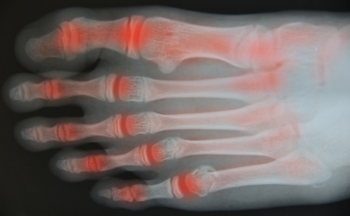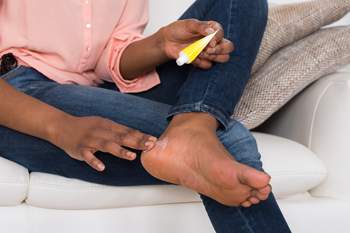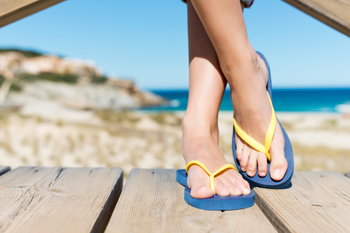October 2020
What Are the Symptoms of Hallux Rigidus?
 Hallux rigidus is a disorder of the joint located at the base of the big toe. This condition causes arthritic pain and stiffness in the joint. With time, the joint loses mobility, and it becomes increasingly hard to bend the toe. The pain and stiffness in the big toe may be most noticeable during walking, standing, or bending, and can lead to difficulties performing physical activities like running. The pain and stiffness may also be aggravated by cold, damp weather. As the disorder progresses, pain may become more constant, even when resting, and can cause difficulties when wearing shoes. Dull pain in the hips, knees, and lower back may develop due to changes in the way you walk, and in severe cases, you may begin to limp. If you are experiencing any of the symptoms of hallux rigidus, it is recommended that you visit a podiatrist for diagnosis and treatment.
Hallux rigidus is a disorder of the joint located at the base of the big toe. This condition causes arthritic pain and stiffness in the joint. With time, the joint loses mobility, and it becomes increasingly hard to bend the toe. The pain and stiffness in the big toe may be most noticeable during walking, standing, or bending, and can lead to difficulties performing physical activities like running. The pain and stiffness may also be aggravated by cold, damp weather. As the disorder progresses, pain may become more constant, even when resting, and can cause difficulties when wearing shoes. Dull pain in the hips, knees, and lower back may develop due to changes in the way you walk, and in severe cases, you may begin to limp. If you are experiencing any of the symptoms of hallux rigidus, it is recommended that you visit a podiatrist for diagnosis and treatment.
Arthritis can be a difficult condition to live with. If you are seeking treatment, contact Dr. John C. Lawlor from Florida. Our doctor can provide the care you need to keep you pain-free and on your feet.
Arthritic Foot Care
Arthritis is a joint disorder that involves the inflammation of different joints in your body, such as those in your feet. Arthritis is often caused by a degenerative joint disease and causes mild to severe pain in all affected areas. In addition to this, swelling and stiffness in the affected joints can also be a common symptom of arthritis.
In many cases, wearing ill-fitting shoes can worsen the effects and pain of arthritis. Wearing shoes that have a lower heel and extra room can help your feet feel more comfortable. In cases of rheumatoid arthritis, the arch in your foot may become problematic. Buying shoes with proper arch support that contour to your feet can help immensely.
Alleviating Arthritic Pain
- Exercises that stretch the foot can prevent further pain and injury and increase mobility
- Most of the pain can be alleviated with anti-inflammatory drugs, heat, and topical medications
- Massages can help temporarily alleviate pain.
It is best to see your doctor for the treatment that is right for your needs and symptoms. Conditions vary, and a podiatrist can help you determine the right method of care for your feet.
If you have any questions, please feel free to contact one of our our offices located in Cape Coral and LaBelle, FL . We offer the newest diagnostic tools and technology to treat your foot and ankle needs.
Read more about Arthritic Foot CarePlantar Warts Can Be Treated!
How Can I Prevent Cracked Heels?
 Cracked heels can have a variety of causes. It is believed that intense pressure or friction on the feet is the primary cause of cracked heels, however, they may also come about as a result of not moisturizing your feet regularly, taking overly long, hot showers, using harsh soaps, harsh weather conditions, wearing shoes that have open backs or thin soles, and wearing poorly fitted high heels. One home treatment for cracked heels is applying a thick layer of moisturizer to your feet after a shower or bath and then putting on a pair of cotton socks. To prevent cracked heels, it is suggested that you avoid harsh soaps and scrubbing your feet, and that you wear supportive shoes and breathable socks to reduce friction. For more information on how to prevent and treat cracked heels, consult with a podiatrist today.
Cracked heels can have a variety of causes. It is believed that intense pressure or friction on the feet is the primary cause of cracked heels, however, they may also come about as a result of not moisturizing your feet regularly, taking overly long, hot showers, using harsh soaps, harsh weather conditions, wearing shoes that have open backs or thin soles, and wearing poorly fitted high heels. One home treatment for cracked heels is applying a thick layer of moisturizer to your feet after a shower or bath and then putting on a pair of cotton socks. To prevent cracked heels, it is suggested that you avoid harsh soaps and scrubbing your feet, and that you wear supportive shoes and breathable socks to reduce friction. For more information on how to prevent and treat cracked heels, consult with a podiatrist today.
If the skin on your feet starts to crack, you may want to see a podiatrist to find treatment. If you have any concerns, contact Dr. John C. Lawlor from Florida. Our doctor can provide the care you need to keep you pain-free and on your feet.
Cracked Heels
It is important to moisturize your cracked heels in order to prevent pain, bleeding, and infection. The reason cracked heels form is because the skin on the foot is too dry to support the immense pressure placed on them. When the foot expands, the dry skin on the foot begins to split.
Ways to Help Heal Them
- Invest in a good foot cream
- Try Using Petroleum Jelly
- Ease up on Soaps
- Drink Plenty of Water
Ways to Prevent Cracked Heels
- Moisturize After Showering
- Skip a Shower
- Keep Shower Water Lukewarm
- Don’t Scrub Your Feet
If you are unsure how to proceed in treating cracked heels, seek guidance from a podiatrist. Your doctor will help you with any questions or information you may need.
If you have any questions, please feel free to contact one of our our offices located in Cape Coral and LaBelle, FL . We offer the newest diagnostic and treatment technologies for all your foot care needs.
Read more about Solutions for Cracked HeelsWearing Flip-Flops Can Alter the Way You Walk
 Flip-flops, with their roomy design and flat soles, may seem better for your feet than other shoes. Unfortunately, they aren’t. In fact, frequently wearing flip-flops can greatly damage the health of your feet. Flip-flops lack support for the foot, and their loose design requires you to scrunch your toes to keep them on your feet as you walk. This can alter the way you walk, also known as your gait. Those who wear flip-flops frequently are more likely to walk with short strides and with their ankles turned overly inward. This walking pattern can increase the risk of developing ankle and hip pain. Frequent flip-flop use can also cause plantar fasciitis, a painful inflammation of the ligament that runs along the bottom of the foot, from the heel to the toes. For more information about the dangers of flip-flops, and to discover healthier footwear options, consult with a podiatrist.
Flip-flops, with their roomy design and flat soles, may seem better for your feet than other shoes. Unfortunately, they aren’t. In fact, frequently wearing flip-flops can greatly damage the health of your feet. Flip-flops lack support for the foot, and their loose design requires you to scrunch your toes to keep them on your feet as you walk. This can alter the way you walk, also known as your gait. Those who wear flip-flops frequently are more likely to walk with short strides and with their ankles turned overly inward. This walking pattern can increase the risk of developing ankle and hip pain. Frequent flip-flop use can also cause plantar fasciitis, a painful inflammation of the ligament that runs along the bottom of the foot, from the heel to the toes. For more information about the dangers of flip-flops, and to discover healthier footwear options, consult with a podiatrist.
Flip-flops are not always the best choice of footwear. If you have any concerns about your feet or ankles, contact Dr. John C. Lawlor from Florida. Our doctor will assist you with all of your foot and ankle needs.
Flip-Flops and Feet
When the weather starts warming up, people enjoy wearing flip-flops. Flip-flops are comfortable, stylish, and easy to slip on and off; they're perfect for any summer beach goer. However, these shoes can cause harm to the feet.
How Can Flip-Flops Affect Me Long-Term?
- Ankle problems
- Hip problems
- Lower back problems
- Pain in the balls of the feet
- Problems with foot arches
- Changes in the way you walk
Are There Injuries Associated with Flip-Flops?
Yes. Since flip-flops are relatively weak and do not provide the same amount of support as sneakers, people who wear flip-flops regularly are more susceptible to injuries. On top of that, the open nature of the shoe makes your feet more prone to other problems, such as cuts and even infections. Common injuries and ailments include:
- Sprained ankles
- Blisters
- Infections
- Cuts and Scrapes
I like Wearing Flip-Flops. Are There Safe Alternatives?
When buying flip-flops, try to find ones that have sturdy soles and that are made of high-quality materials that will support for your feet. These flip-flops will cost more but will also last longer as a result.
If you have any questions please feel free to contact one of our our offices located in Cape Coral and LaBelle, FL . We offer the newest diagnostic and treatment technologies for all your foot and ankle needs.
An Explanation of Peripheral Neuropathy
The body’s nervous system is composed of two parts: the central nervous system, which consists of the brain and spinal cord, and the peripheral nervous system, which consists of the nerves running from the brain and spinal cord to the rest of the body. Peripheral neuropathy is a disorder that occurs when the nerves of the peripheral nervous system are damaged or destroyed, impairing the relay of messages from the brain and spinal cord to the other parts of the body. The peripheral nerves travel to the arms, hands, legs, and feet. When these nerves are damaged, you may experience numbness and pain in these areas. Peripheral neuropathy that affects the lower limbs can be especially concerning, as it can cause difficulty walking and a loss of sensation that makes foot wounds and infections more likely to develop. If you are experiencing the symptoms of peripheral neuropathy in your lower limbs, it is suggested that you seek the care of a podiatrist.
Neuropathy
Neuropathy can be a potentially serious condition, especially if it is left undiagnosed. If you have any concerns that you may be experiencing nerve loss in your feet, consult with Dr. John C. Lawlor from Florida. Our doctor will assess your condition and provide you with quality foot and ankle treatment for neuropathy.
What Is Neuropathy?
Neuropathy is a condition that leads to damage to the nerves in the body. Peripheral neuropathy, or neuropathy that affects your peripheral nervous system, usually occurs in the feet. Neuropathy can be triggered by a number of different causes. Such causes include diabetes, infections, cancers, disorders, and toxic substances.
Symptoms of Neuropathy Include:
- Numbness
- Sensation loss
- Prickling and tingling sensations
- Throbbing, freezing, burning pains
- Muscle weakness
Those with diabetes are at serious risk due to being unable to feel an ulcer on their feet. Diabetics usually also suffer from poor blood circulation. This can lead to the wound not healing, infections occurring, and the limb may have to be amputated.
Treatment
To treat neuropathy in the foot, podiatrists will first diagnose the cause of the neuropathy. Figuring out the underlying cause of the neuropathy will allow the podiatrist to prescribe the best treatment, whether it be caused by diabetes, toxic substance exposure, infection, etc. If the nerve has not died, then it’s possible that sensation may be able to return to the foot.
Pain medication may be issued for pain. Electrical nerve stimulation can be used to stimulate nerves. If the neuropathy is caused from pressure on the nerves, then surgery may be necessary.
If you have any questions, please feel free to contact one of our our offices located in Cape Coral and LaBelle, FL . We offer the newest diagnostic and treatment technologies for all your foot care needs.










